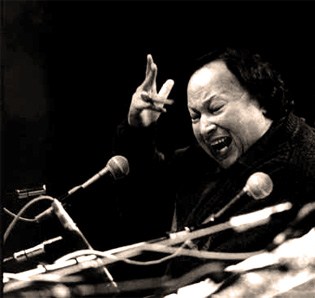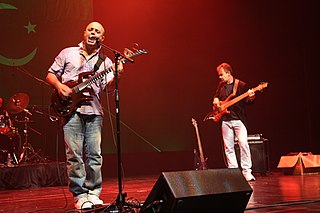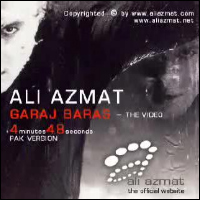
Ustad Nusrat Fateh Ali Khan was a Pakistani singer, songwriter, and music director. He was primarily a singer of qawwali — a form of Sufi devotional music. Often called the "Shahenshah-e-Qawwali", he is considered by The New York Times to be the greatest qawwali singer of his generation. He was described as the fourth greatest singer of all time by LA Weekly in 2016. He was known for his vocal abilities and could perform at a high level of intensity for several hours. Khan is widely credited with introducing qawwali music to international audiences. He was also a master in Hindustani classical music.
The Music of Pakistan includes diverse elements ranging from music from various parts of South Asia as well as Central Asian, Middle Eastern, and modern-day Western popular music influences. With these multiple influences, a distinctive Pakistani music has emerged.

Junoon is a Pakistani sufi rock band from Lahore, Punjab, Pakistan, and Tappan, New York, formed in 1990. The band is directed by founder, lead guitarist and songwriter, Salman Ahmad, who was soon joined by keyboardist Nusrat Hussain, bass guitarist Brian O’Connell and vocalist Ali Azmat. Junoon is Pakistan's and one of South Asia's most successful bands. Since their inception, the group has released a total of nineteen albums: seven studio albums; one soundtrack; two live albums; four video albums; and five compilations. They have sold over 30 million records worldwide.
Allah Hoo is a traditional Sufi chant (dhikr) consisting of the word for God run together three times, followed by Truth (haqq): Allāhu Allāhu Allāhu Haqq, itself repeated three times over. According to Sufi tradition, this formula was introduced by Abu Bakr as he initiated the Naqshbandi tradition. Other Dhikrs consist of simple Allāhu Allāhu run together 400 or 600 times.

Rahat Fateh Ali Khan is a Pakistani singer, primarily Qawwali, a form of Sufi devotional music. Khan is one of the most popular and highest paid singers in Pakistan. He is the nephew of Nusrat Fateh Ali Khan, son of Farrukh Fateh Ali Khan and grandson of Qawwali singer Fateh Ali Khan. In addition to Qawwali, he also performs ghazals and other light music. He is also well-known as a playback singer in Hindi cinema and the Pakistan film industry.
Fateh Ali Khan Jullundhri Qawwal was a classical singer and a qawwali musician in the 1940s and 1950s.

Farrukh Fateh Ali Khan was a Pakistani musician, who played the harmonium in Qawwali music. He was also a member of a well-known family of Qawwali musicians, the Qawwal Bacchon gharana, he was the younger brother of Nusrat Fateh Ali Khan, the son of Fateh Ali Khan, the nephew of Mubarak Ali Khan, and the father of Rahat Fateh Ali Khan.
Filmi qawwali is a form of qawwali music found in the Lollywood, Dhallywood, Tollywood, and Bollywood film industries.

Mustt Mustt is the first Qawwali fusion album collaboration between singer Nusrat Fateh Ali Khan and guitarist and producer Michael Brook, although the album itself is credited purely to Khan. It was rock musician Peter Gabriel who suggested that Brook and Khan work together. It was released in 1990 on Gabriel's Real World Records label.

Night Song is a collaborative studio album by Pakistani qawwali singer Nusrat Fateh Ali Khan and Canadian ambient musician, guitarist and producer Michael Brook. Recorded in 1995 and released in 1996 on Real World Records, it was Khan's last album released on the label during his lifetime. Khan and Brook had previously collaborated for Mustt Mustt (1990), a critically acclaimed world fusion album said to have led Pakistani youth to discover Sufi religious music. The two had not worked for some time but collaborated again for a new album in 1995, naming the album Night Song. The album was produced by Brook, who developed an innovative but difficult production process for the album. Khan recorded improvisations for the album, and Brook had to decide which sections, some of which were an hour long, were the best and how they were going to fit together, without having a structural point of reference to start with or aim towards. He had components recorded on multi-track tapes, and created each track part by part, overdubbing his instrumentation atop of it, a manual process that predated easy forms of digital editing.
Pakistani popular music or shortly Pakistani pop music refers to popular music forms in Pakistan. Pakistani pop is a mixture of traditional Pakistani classical music and western influences of jazz, rock and roll, hip hop and disco sung in various languages of Pakistan, including Urdu. The popularity of music is based on the individual sales of a single, viewership of its music video or the singer's album chart positions. Apart from within Pakistan, Pakistani pop music has also achieved an influential following and popularity in neighboring countries and is listened by members of the Pakistani diaspora, especially in the Middle East, Europe and North America.

"Garaj Baras" is the seventh track on the 2003 album Dewaar by the sufi rock band Junoon. The song is written by the band's vocalist, Ali Azmat and lyricist, Sabir Zafar. The single was selected as part of a Bollywood movie soundtrack in 2003 for the film Paap directed by Pooja Bhatt. The song topped the charts in both India and Pakistan in 2004.
Dama Dam Mast Qalandar is a spiritual Sufi qawwali written in the honour of the most revered Sufi saint of Sindh, Lal Shahbaz Qalandar (1177–1274) of Sehwan Sharif. The origins of the poem is unknown, since no recordings or written documents exist mentioning it prior to the 1950s. However, legends around the Shrine of Lal Shahbaz Qalandar in Sehwan suggest that the original poem was initially written by the 13th-century Sufi poet Amir Khusrow, then further modified by Bulleh Shah in the 18th century. The poem includes a reference to the town of Sehwan, and the word "Lal" can refer to Lal Shahbaz Qalandar as a young man, his legendary ruby glow, or his red dress. Bulleh Shah gave an entirely different color to the qawwali, adding verses in praises of Shahbaz Qalandar and giving it a large tint of Sindhi culture. It also venerates Ali, the cousin and son-in-law of Muhammad.
Most of Nusrat Fateh Ali Khan's early music was recorded with Rehmat Gramophone House later turned RGH Label. Throughout the ’70s and early ’80s Nusrat Fateh Ali Khan released hundreds of cassettes, most of them containing one or two lengthy songs. Chris Nickson, of Global Rhythm, argues that trying to make order of Khan's entire discography would be a nightmare.

Asim Raza is a Pakistani film and television commercial director and producer. Asim began his career as an architect and worked with the architectural firm Arshad Shahid Abdullah (PVT) LTD before venturing into film production and direction. He made his debut as a film maker in the mid-90s, he worked in all visual mediums from TV commercials to music videos, long plays and feature films. In 2004, Asim won the Lux Style Award for Best Music Video Director for "Mahi Ve". In 2013, Asim directed a television film, Behadd which won the Hum Award for Best Television Film. Asim marked his feature film debut with a coming-of-age drama Ho Mann Jahaan, Asim Raza owns a production company called The Vision Factory.
"Tumhe Dillagi" is a ghazal song written by lyricist Purnam Allahabadi and composed by prominent Sufi singer of Pakistan Nusrat Fateh Ali Khan.
"Mere Rashke Qamar" is a ghazal-qawwali written by Urdu poet Fana Buland Shehri and composed by Nusrat Fateh Ali Khan. It was first performed in 1988 by Khan, and popularized by him and his nephew Rahat Fateh Ali Khan several times in different concerts.
"Sochta Hoon" is a ghazal-qawwali written and performed by Nusrat Fateh Ali Khan, originally in UK 1985 Tour on 28 February at Allah Ditta Centre Birmingham. It had been popularized by him and his nephew Rahat Fateh Ali Khan several times in different concerts.








